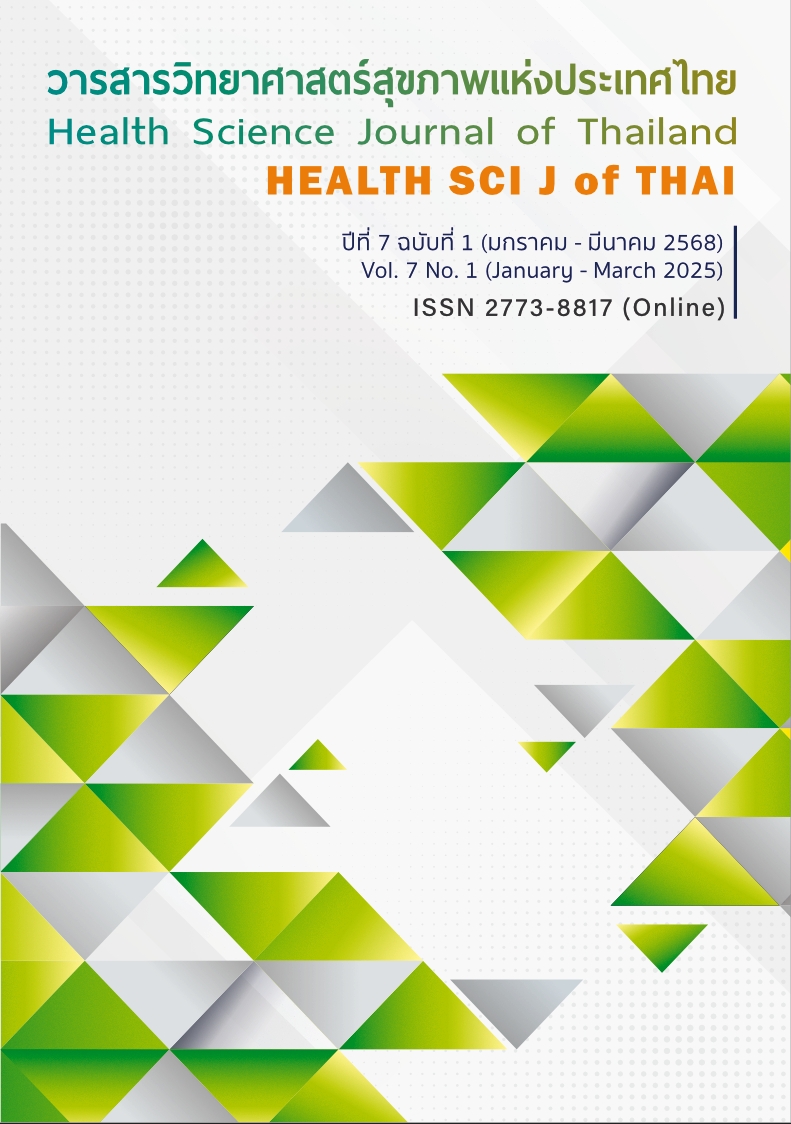Confirmatory Factor Analysis of Health Literacy in COVID-19 Prevention of Back Office Staff in Hospital
Main Article Content
Abstract
Health literacy in COVID-19 prevention helps support staff gain correct and effective knowledge and understanding of disease prevention, which can be applied in daily life. Therefore, tools for measuring health literacy are important for accurately assessing staff knowledge and understanding levels. This study aims to investigate the confirmatory components of health literacy in COVID-19 prevention among support staff working at Thammasat University Hospital. The study results show that the majority of the sample group is female (88.38%), aged between 31-40 years (38.38%), married or in a partnership (56.57%), and has an education level below a bachelor's degree (56.06%). In their families, 78.54% have members who contracted COVID-19, and 67.17% of the sample themselves have been infected with COVID-19. The confirmatory components of health literacy in COVID-19 prevention include access to information, knowledge and understanding, communication skills, self-management, media literacy, and decision-making skills. All these components are positively correlated, and the second-order confirmatory factor model aligns with the empirical data (χ² = 3.83, df = 2, p-value = 0.147, GFI = 0.996, AGFI = 0.963, RMR = 0.011, RMSEA = 0.050). Therefore, these six confirmatory components can be used to measure health literacy in COVID-19 prevention for support staff in various nursing service institutions.
Article Details

This work is licensed under a Creative Commons Attribution-NonCommercial-NoDerivatives 4.0 International License.
References
World Health Organization. WHO Coronavirus (COVID-19) Dashboard. [Internet] 2021. (Cited 15 July 2021). Available from: https://covid19.who.int/
Department of Disease Control, Ministry of Public Health. Report on the Situation of Coronavirus Disease 2019. [Internet] 2021. (Cited 16 July 2021). Available from: https://ddc.moph.go.th/viralpneumonia. (In Thai)
Leuvarnitch C. Health Literacy and New Normal Lifestyle for Self-Protection against Novel Coronavirus 2019 among People Living in Phuket Province. Health Research and Development Journal 2020; 7(1): 60-74. (In Thai)
Sentell T, Vamos S, Okan O. Interdisciplinary Perspectives on Health Literacy Research Around the World: More Important Than Ever in a Time of COVID-19. Int J Environ Res Public Health 2020; 17(9): 3010. (In Thai)
Okan O, Bollweg TM, Berens EM, Hurrelmann K, Bauer U, Schaeffer D. Coronavirus-Related Health Literacy: A cross-Sectional study in Adult during the COVID-19 Infordemic in Germany. International Journal of Environmental Research and Public Health 2022; 17(15): 55-69.
Castro-Sanchez E, Chang P, Vila-Candel R, Escobedo AA, Holmes AH. Health literacy and infectious diseases: why does it matter. International Journal of Infectious Diseases: Official Publication of the International Society for Infectious Diseases 2022; 43:103-110.
Seng JJB, Yeam CT, Huang CW, Tan NC, Low LL. Pandemic-related health literacy: A systematic review of literature in COVID-19, SARS and MERS pandemics. Singapore Medical Journal; 2023. (In Thai)
Cangussu LR, Barros I, Botelho filoho C, Sampaio filho J, Lopes MR. COVID-19 and health literacy: the yell of a silent epidemic amidst the pandemic. Rev Assoc Med Bras (1992). 2020; 66(2):31-33.
Boonsiri C, Patthachip K, Choojai R, Effects of a Health Literacy Enhancement Program for COVID-19 Prevention on Health Literacy and Prevention Behavior of COVID-19 among Village Health Volunteers in Don Tako Sub-district, Mueang District, Ratchaburi Province. Journal of Nursing and Public Health 2021; 8(1): 250-262. (In Thai)
Silva MJ, Santos P. The Impact of Health Literacy on Knowledge and Attitudes towards Preventive Strategies against COVID-19: A Cross-Sectional Study. Int J Environ Res Public Health. 2021; 18(10): 5421.
Hair JF, Black WC, Babin BJ, Anderson RE. Multivariate data analysis. Harlow: Pearson Education Limited; 2014.
Thanin S. Research and analysis of statistical data using SPSS and AMOS. (Eighteenth edition) Bangkok: R&D Ordinary Partnership Business; 2020. (In Thai)
Phanthupha L. The Development of Health Literacy Model for Prevention Coronavirus Disease 2019 of COVID-19 volunteer teams in Thakhantho District Kalasin Province 2023; 8 (4): 1-10. (In Thai)
Tienthavorn V, Chaitiang N. Relationship between Health Literacy and Behaviors to Prevent COVID-19 among University Students. Thai Journal of Public Health and Health Sciences 2021; 4(2): 126–137. (In Thai)
Thongpools N. Confirmatory Factor Analysis of a Social Media Literacy Measurement Model for Undergraduate Students. [Internet] 2021. (Cited 15 July 2021). Available from: http://scir.rmutk.ac.th/files/users/180/journal/1533281690.pdf. (In Thai)


